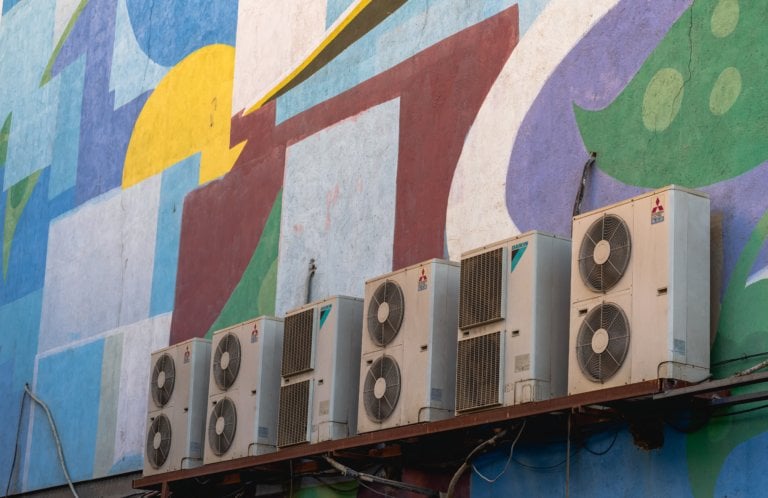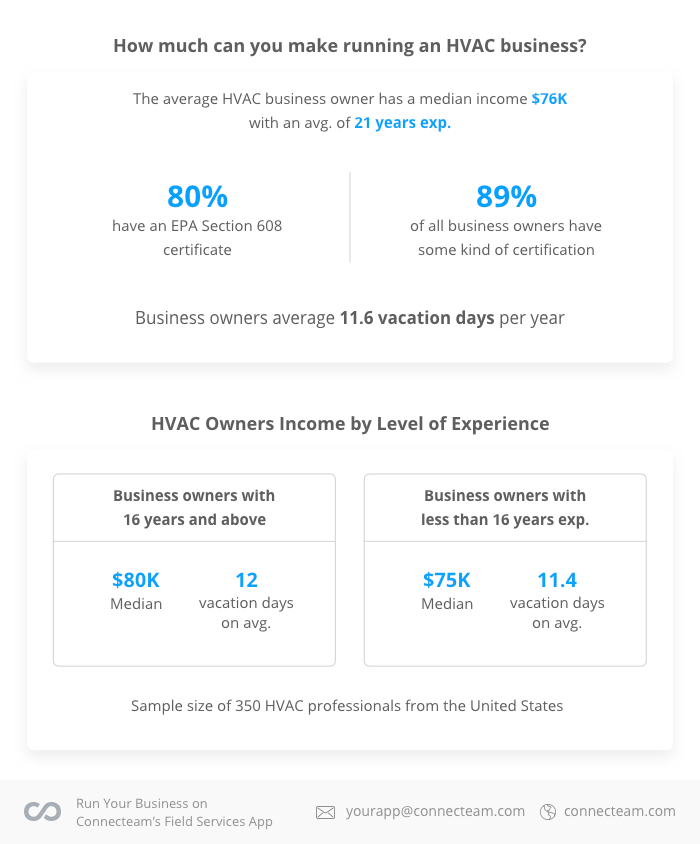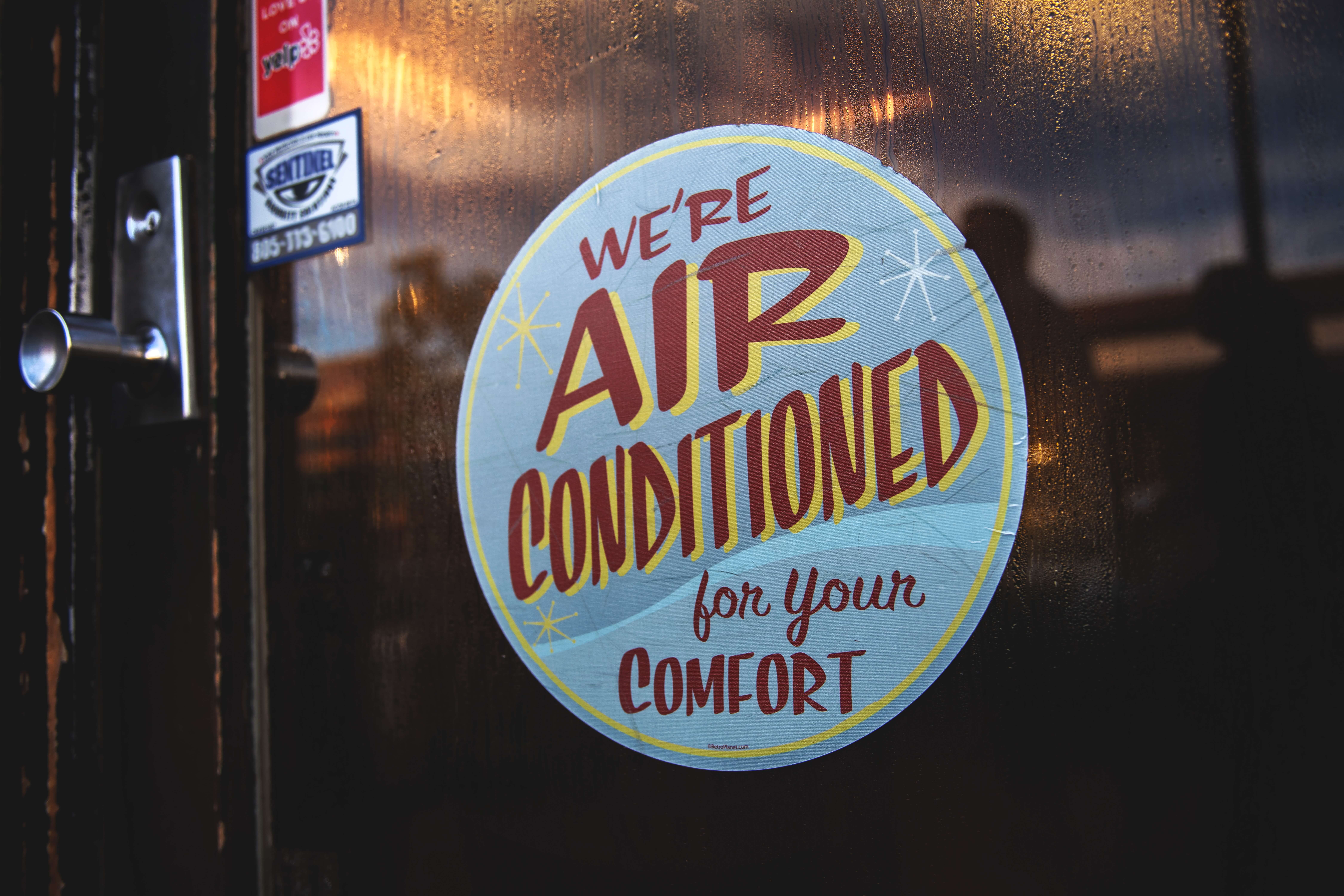The future of HVAC-R will be very exciting (and green) one. Regardless of your job title, HVAC-R is becoming a more technological industry, which requires a new skill set. Wi-fi thermostats are just the beginning. The HVAC tech of tomorrow will still need to know how to connect a mixing valve but they’ll also need to know how to use complex building management software, interface IoT (internet of things) and smart home devices with A/C units, learn how to troubleshoot them, and move a lot more of their operation online.
Change in general, and new technology in particular can be overwhelming. However, if you get in front it, and take small bites at a time you may find that the technological demon is not so bad. It can actually be your friend. I mean, for business owners, technology introduce productivity tools and help them grow their business with marketing software.
Working joes also have a lot to gain. New technology brings with it new opportunities for professional growth. The HVAC tech that Learns new technology and keeps up with the industry trends will have a new and valuable skill set. Basically, to stay ahead of the curve, every tech should be rubbing its HVAC-R crystal ball.
This may come as no surprise to some but many in the industry tend to downplay the importance of education vs. hands-on experience. If you need further convincing, the HVAC-R salary survey below will get you there.
According to our 2018 HVAC-R salary survey, the most significant factor in achieving higher pay is education. 61% of the HVAC-R professionals and business owners surveyed had completed some kind of professional education. 80% of the industry has an EPA Section 608 certificate. However, if you also have an undergraduate degree (BS) in HVAC-R your median salary is 32% higher than someone who just has a Section 608.

Not one to just drop an infographic with a ton of information and leave I’ve gone ahead and broken it down below. Each section also has some interesting insights for newbies, more experienced employees and managers, and business owners too. If you have any questions, comments, or insights you’d like to share; if you think that we’re way off or are spot on please share your thoughts in the comments section at the end of the article and we will reply.
What do you do?
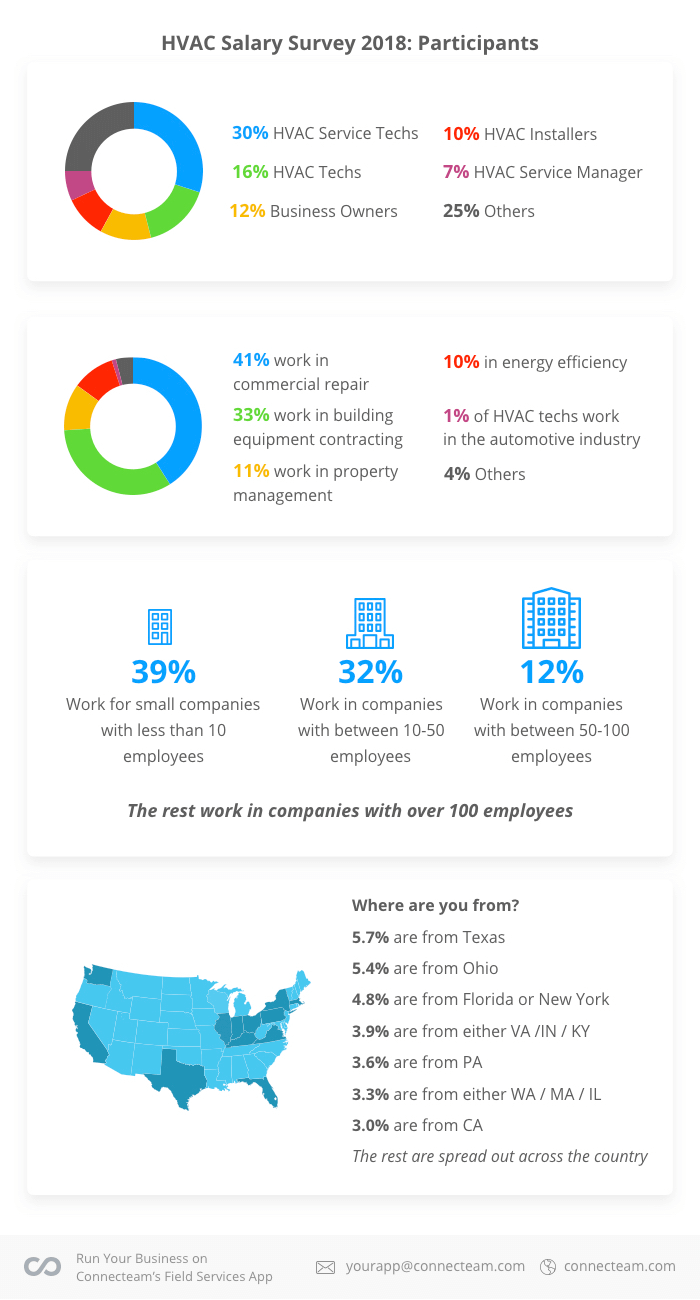
Like most salary surveys this one also lets you compare where you stand relative to your industry peers. What makes this salary survey unique is that we included business owners as part of our survey. So if you’re an HVAC-R business owner you’re in good company. 12% of those surveyed described themselves as HVAC-R business owners. Stay tuned, business owners, this survey will also cover average and the median income for business owners too, and average years of experience and benefits.
47% of those surveyed described themselves as HVAC-R Service Techs or HVAC-R Service Managers while only 10% are HVAC-R Installers, which, by the way, have the lowest industry salary at $38K a year. Looks like the maintenance guys dominate the industry over the installers. They could be doing both installs and maintenance but since 41% stated that they work in the commercial repair, and another 11% are in property management, then it makes sense that there are more maintenance techs in the audience.
However, neither the maintenance tech nor the installers are making an above-average salary. To do that, you need to either be a manager or supervisor, an HVAC-R engineer, or a refrigeration tech.
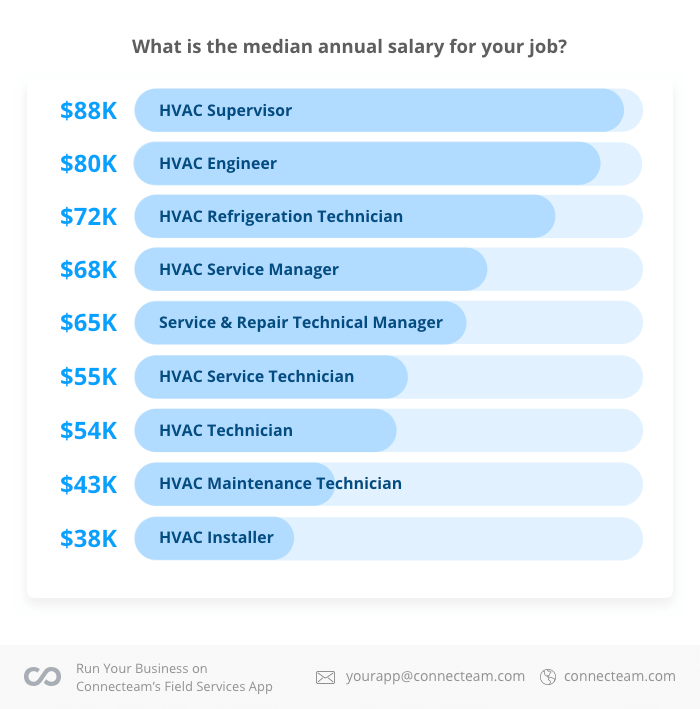
When it comes to location, Texas and Ohio make up about 11% of the audience with a little less coming in from Florida and New York. In general, most of the professionals surveyed are from the North East United States or the larger states like Texas, Florida, and California.
The one standout is Washington. It is difficult to find commonality here. Weather doesn’t seem to be a factor. Some states are colder, like Indiana and Illinois, while others are warmer, like Florida and Texas. However, none of the really cold states are on here and the warm states don’t dominate the survey either.
The one thing in common for most of the states, which lead in the number of techs, have in common is they lead the nation in GDP (Gross Domestic Product), meaning they have strong economies.
What did you study?
As mentioned before, the HVAC-R industry is becoming more techy and more bookwormy. In fact, 61% have completed some kind of professional education.
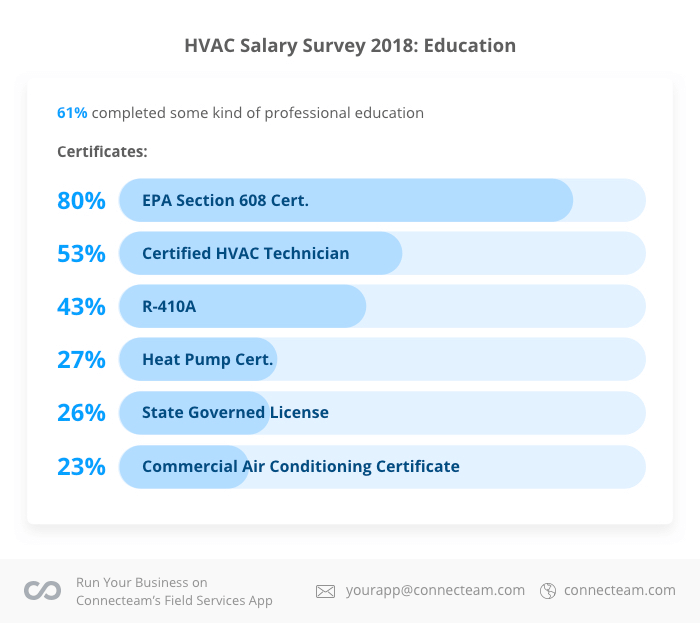
By far, the most common certificate is an EPA Section 608. No doubt, this is due to federal regulations. Section 608 of the Federal Clean Air Act requires that all persons who maintain, service, repair, or dispose of appliances that contain regulated refrigerants be certified in proper refrigerant handling techniques. Obviously, we all prefer to remain compliant with federal regulations, which is why 80% of HVAC-R professionals and business owners have passed the EPA Section 608 Certification.
However, just having a Section 608 is not enough. If you don’t have any other degrees or certifications then you’re going to make about $51,000 a year, which is below the industry median of $55,000.
The next most popular certificate, after the Section 608 cert, is the Certified HVAC-R Technician certificate held by 53% of HVAC-R pros. Your HVAC-R schools will probably tell you that you should get this certificate as you will make more money being a Certified HVAC-R Tech, and, your elders may scoff and tell you not to waste your time. Actually, they’re right! Certified HVAC-R Techs only make about 10% more than the median industry salary.
The same goes for an R-410A. Getting it doesn’t provide a significant bump over the industry median. R-410As have 17 years of experience on average and a median of $62K.
#1 HVAC Business App
HVAC scheduling and dispatch, multiple communication tools, resource center, equipment manuals, online reports and ticketing system, all available in one place with Connecteam’s HVAC App.
So what certificate will give you a significant salary bump?
HVAC Bachelor’s Degree
Technically more than a certificate, an Associate degree in HVAC or a Bachelor’s degree in HVAC can really boost your salary. A BS in HVAC can increase your salary by about 20% over the industry median. Not only that, on average, but HVAC BS graduates also have 4 years less experience than the industry average so, in the long run, as the numbers of degree holders increases and they build their hands-on experience you will probably see even higher salaries.
One thing to take away is that HVAC academics start off with about $40K a year so even at the lower end of the pay spectrum, without any experience, they still make significantly more. Also, less than 20% have an HVAC BS degree. The higher salaries could be explained by the lack of graduates compared to increasing demand by employers.
HVAC-R Associate Degree
There was a surprise in the research when it came to an Associate Degree in HVAC-R. Similarly, to a BS in HVAC an AS in HVAC-R does move the needle up a few pay grades. What was surprising is that it moved the needle higher than a BS degree. Graduates have a median salary of about $68K, 24% over the industry average of $55K.
It’s also worth mentioning that on average, the AS graduates surveyed had an average of 16 years of experience, which could explain why they make more than those with a BS degree overall.
Commercial A/C Certification
Where we also see a very nice salary bump is with commercial certificates. The first, Commercial A/C Cert. brings in a median of $69K a year. On average, most techs with a Commercial A/C Cert. have 18 years of experience so don’t expect to get that coming out of school. That being said, having it gives you a 20% increase over the industry median salary and a 30% increase over those with just a Section 608.
Commercial Refrigeration Certificate
A Commercial refrigeration Certificate will net you a median salary of $69K a year, which is an even better increase than the Commercial A/C Certificate. This will put you way ahead of the industry mean but, again, keep in mind that of those polled, the techs with a Commercial Refrigeration Certificate average 19 years on the job.
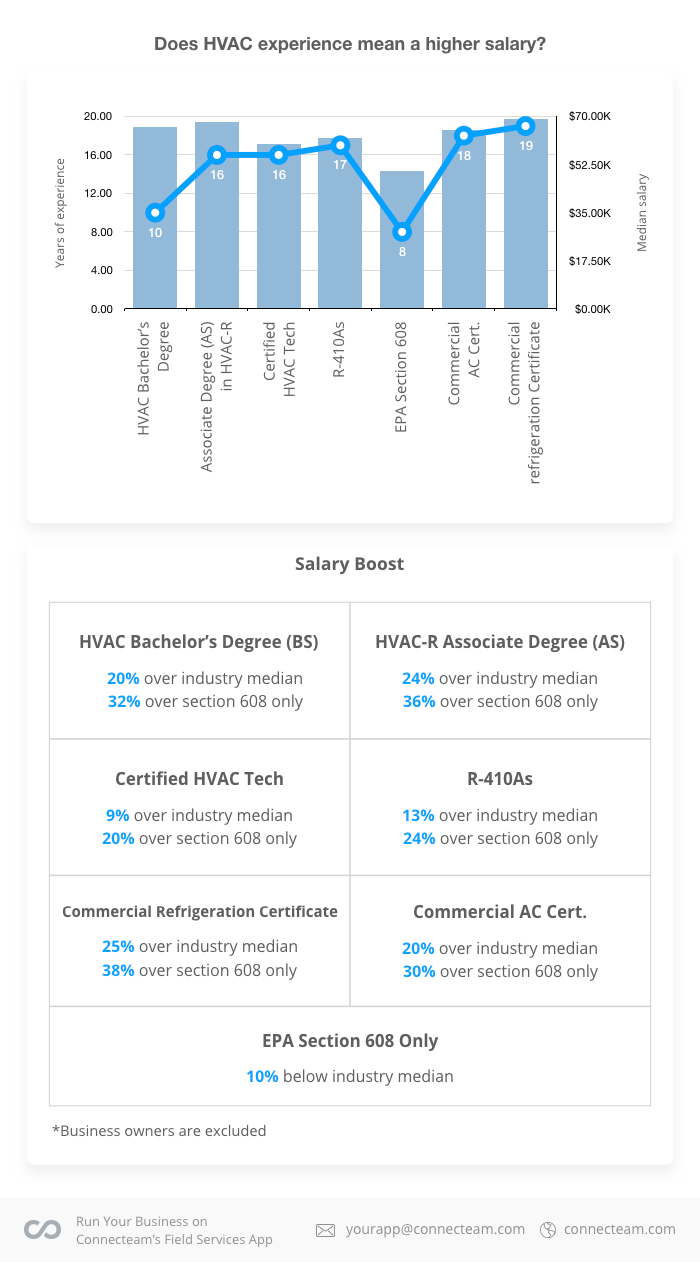
How important is a professional experience in HVAC-R?
You don’t need to be Linda and Terry Jamison (aka The Psychic Twins) to know that experience matters. If you have less than 5 years in the industry you can expect to make a median $40K a year, which is 27% less than the industry median and the median for those with between 6-10 years experience.
Where it gets interesting is in the next bracket: 11-15 years of experience. If the 0-5 years of experience bracket make 27% less than those with 6-10 years, the 6-10 bracket makes only 14% less than those with 11-15 years of experience, and the 16 and above don’t make much more. It would seem that after a certain level of experience salaries start to plateau, which could also strengthen the case for education.
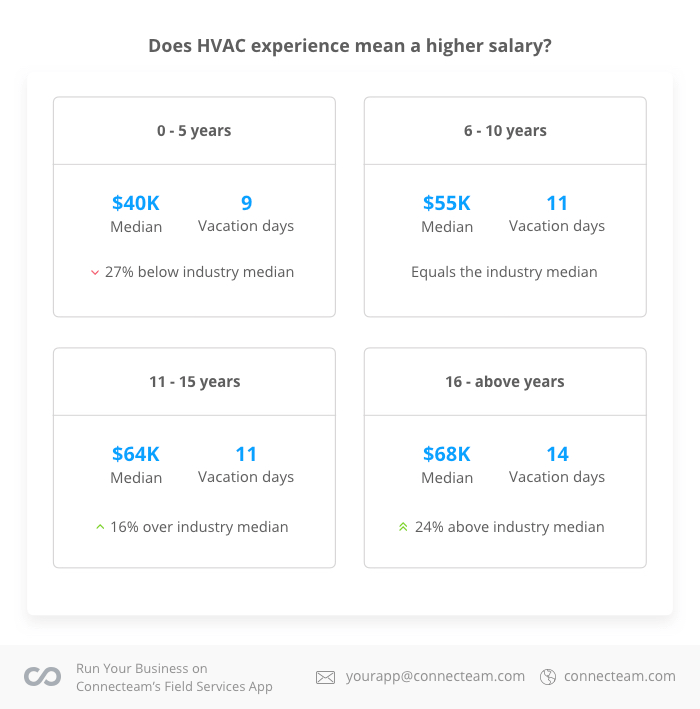
What about business owners?
12% of the survey respondents were HVAC-R business owners and owners are people too. Since we’re already crunching the numbers what’s a few more. With business owners, the income range was even wider-ranging than with our working joes. For example, the average income of a business owner is $598K a year. Pretty good, right?
However, the median is only $76K. This means that we have a few business owners at the far end of the pay scale making a few million a year. One HVAC-R business owner even makes a cool $20M a year.
Education
80% of business owners have a Section 608, and 80% of business owners have some kind of certificate.
Benefits
Some of us working joes consider owners as having extra time to goof off but, actually, on average owners take 11.6 days off a year, which is almost the same as the industry average of 11.5 days a year.
Professional experience
We divided up the owners into two categories: those with less than 16 years of experience and those with more. Why 16 years? because that was where differences starting becoming more evident.
When examining the median income, Owners with over 16 years of experience make 18% more a year. However, if we look at the average, experienced owners make 365% more! Obviously, we have a few business owners doing extremely well when compared to the rest of the industry.
Why median instead of average (arithmetic mean)?
Warning: a bit of math ahead.
Median is the middle value in a numbers array while an average is the arithmetic mean. The arithmetic mean is reached by adding up all the scores and, then dividing by the number of scores.
When dealing with a sample size that is less than a few thousand results, and many outliers, it is considered more accurate to use the median rather than the average. We actually did calculate the average scores as well but in some cases the outliers made the averages seem unrealistic and removed from the median score.
What’s on the invoice?
If you’re a newbie making their first steps in the industry or you’ve already been up a rooftop or two your bottom line is like this:
- Probably more than any other residential services business HVAC-R is becoming increasingly technologically driven. With new tech being introduced, hands-on experience is less valuable as it may have been in the past. Instead, education and certificates are what have the biggest effect on salaries with anywhere from a 20% – 40% salary bump, depending on the certificate.
- As an employee, if you have to place your eggs in a single basket, go with commercial refrigeration. A Commercial Refrigeration Certificate will increase your salary by about 25% over the industry median.
- Hands-on experience will increase your salary but only to a degree. After about 10 years in the business, salary increases start to taper off.
- For business owners, the income range is huge. New and entrepreneurial owners tend to not make more than what they would if they were working joes. However, stick with it, because over time, owners bring in an income of 36% – 55% more than the industry median. Obviously, owners have more expenses but that’s beyond the scope of this survey.
- It’s not just about HVAC-R technology, for business owners, but technology in general. Technology and software can help the HVAC business owners stay ahead of the competition, be more productive, and grow their business.
Whatever stage you are in your career, the future of HVAC-R looks bright. So, get out there, gain experience, complete courses, and subscribe to our newsletter to get the 2019 Complete HVAC-R Salary Survey.
*This salary survey was conducted using an online survey distributed to over 340 US HVAC-R professionals and business owners.
Connecteam is the all-in-one HVAC app
Connecteam is easy to use and is the best all-in-one HVAC business management software especially designed for your non-desk employees

